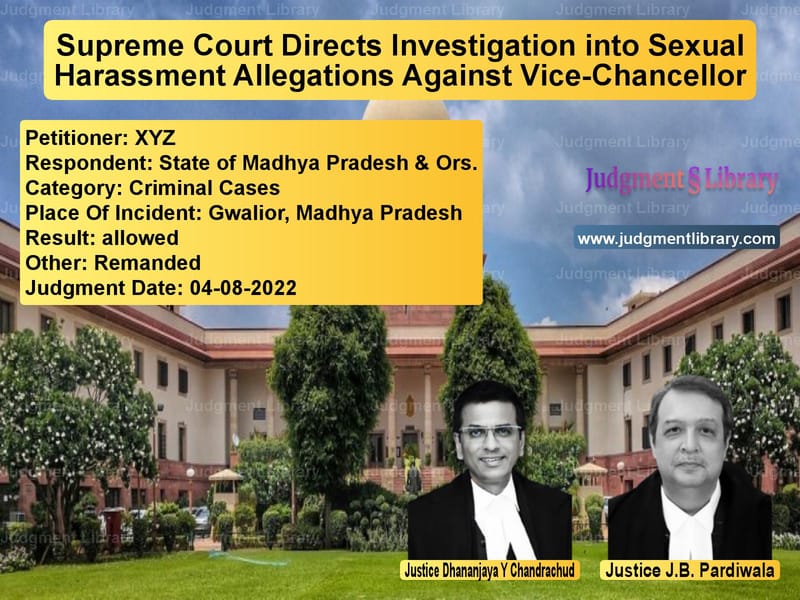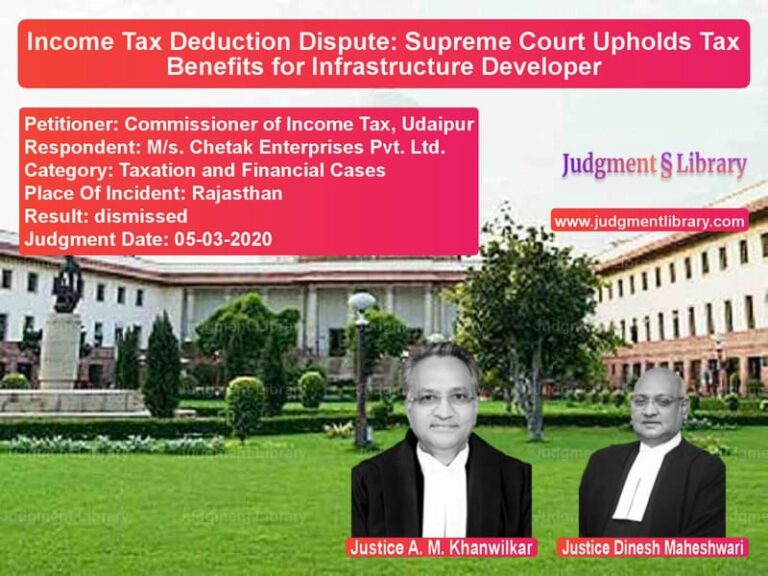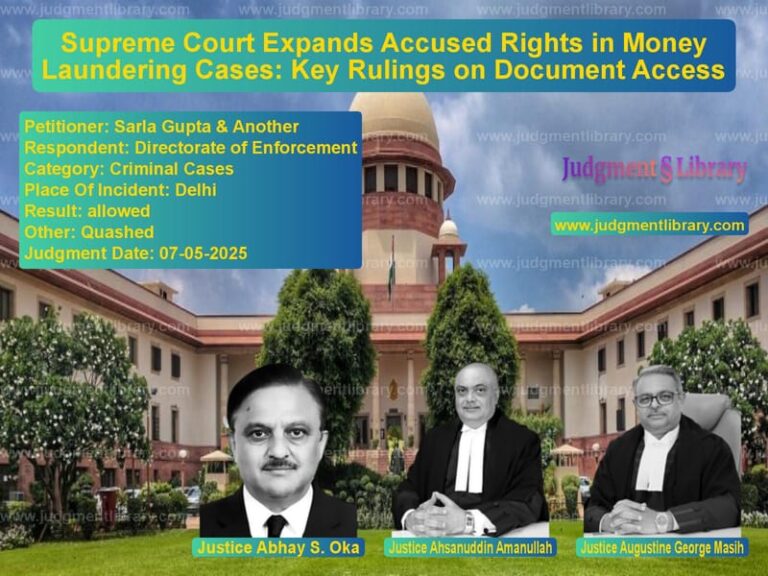Supreme Court Directs Investigation into Sexual Harassment Allegations Against Vice-Chancellor
The case of XYZ vs. State of Madhya Pradesh & Ors. is a significant ruling concerning the handling of sexual harassment complaints within academic institutions. The Supreme Court overturned the decision of the Madhya Pradesh High Court and directed the police to investigate the allegations made by the appellant, a yoga instructor, against the Vice-Chancellor of Lakshmibai National Institute of Physical Education, Gwalior.
Background of the Case
The appellant, a yoga instructor at the Institute, alleged that in March 2019, the second respondent (the Vice-Chancellor) had inappropriately touched her at the workplace. She disengaged herself and immediately raised objections. However, despite her complaints to the police, no action was taken.
On October 14, 2019, she lodged a formal complaint at the Police Station Gole Ka Mandir, Gwalior. When no action was taken, she approached the Superintendent of Police multiple times but received no response. Eventually, she moved the Judicial Magistrate First Class (JMFC) under Section 156(3) of the CrPC, seeking a status report from the police.
Legal Issues Before the Court
- Whether the police had a duty to register an FIR based on the complaint.
- Whether the Magistrate erred in refusing to direct an investigation under Section 156(3) CrPC.
- Whether failure to act on the complaint constituted a violation of the Sexual Harassment of Women at Workplace (Prevention, Protection and Redressal) Act, 2013.
Arguments Presented
Petitioner’s (Appellant’s) Arguments
- The appellant argued that despite repeated complaints, the police had refused to register an FIR, violating her rights under the law.
- The Internal Complaints Committee (ICC) of the Institute had found her allegations against the Vice-Chancellor to be substantiated.
- The police’s refusal to investigate the complaint discouraged victims of sexual harassment from seeking justice.
- She contended that the CCTV footage from the Vice-Chancellor’s office was a crucial piece of evidence but had been deliberately withheld.
Respondents’ (State of Madhya Pradesh & Others) Arguments
- The police argued that their inquiry had found no evidence of a criminal offense and hence no FIR was registered.
- The JMFC had exercised its discretion correctly by deciding to treat the complaint as a private complaint instead of directing an investigation under Section 156(3) CrPC.
- The Vice-Chancellor denied the allegations, claiming that the complaint was motivated by ulterior motives.
Supreme Court’s Observations
On the Duty of Police to Register an FIR
The Supreme Court, comprising Justice Dhananjaya Y Chandrachud and Justice J.B. Pardiwala, held that the failure of the police to register an FIR was contrary to the law established in Lalita Kumari vs. Govt. of Uttar Pradesh.
“When information discloses a cognizable offense, the police have no discretion but to register an FIR and investigate the matter.”
On the Importance of a Fair Investigation
The Court criticized the police for failing to secure crucial evidence such as the CCTV footage from the Vice-Chancellor’s office.
“Where there is a possibility of crucial documentary evidence being in the possession of the accused, a police investigation is essential. The Magistrate ought to have directed the police to investigate rather than leaving the burden on the complainant.”
On the Role of Courts in Handling Sexual Harassment Complaints
The Supreme Court emphasized that courts must deal sensitively with cases involving sexual harassment.
“Aggrieved persons should not have to run from pillar to post for the mere registration of a complaint and initiation of investigation, especially when a cognizable offense is prima facie made out.”
Judgment and Its Implications
The Supreme Court set aside the High Court’s judgment and directed the police to register an FIR and conduct an investigation under the supervision of a woman officer not below the rank of Superintendent of Police.
- The Magistrate was directed to order an investigation under Section 156(3) CrPC.
- The case was remanded to the lower courts with directions to ensure a fair and expeditious investigation.
- The judgment reaffirmed that the police and courts must take allegations of sexual harassment seriously.
Significance of the Judgment
- Ensures Prompt Action on Sexual Harassment Complaints: The ruling affirms that complaints of sexual harassment cannot be ignored by law enforcement authorities.
- Strengthens Women’s Rights: The judgment upholds the rights of women to seek redressal under the Sexual Harassment at Workplace Act.
- Establishes Judicial Sensitivity: The Court’s emphasis on handling such cases with care sets a precedent for lower courts.
Conclusion
The Supreme Court’s ruling in XYZ vs. State of Madhya Pradesh & Ors. is a crucial judgment reinforcing the obligation of law enforcement authorities to investigate complaints of sexual harassment. By overturning the High Court’s decision and directing an independent police investigation, the Court has ensured that survivors of workplace harassment receive the justice they deserve.
Petitioner Name: XYZ.Respondent Name: State of Madhya Pradesh & Ors..Judgment By: Justice Dhananjaya Y Chandrachud, Justice J.B. Pardiwala.Place Of Incident: Gwalior, Madhya Pradesh.Judgment Date: 04-08-2022.
Don’t miss out on the full details! Download the complete judgment in PDF format below and gain valuable insights instantly!
Download Judgment: xyz-vs-state-of-madhya-prad-supreme-court-of-india-judgment-dated-04-08-2022.pdf
Directly Download Judgment: Directly download this Judgment
See all petitions in SC/ST Act Case
See all petitions in Custodial Deaths and Police Misconduct
See all petitions in Judgment by Dhananjaya Y Chandrachud
See all petitions in Judgment by J.B. Pardiwala
See all petitions in allowed
See all petitions in Remanded
See all petitions in supreme court of India judgments August 2022
See all petitions in 2022 judgments
See all posts in Criminal Cases Category
See all allowed petitions in Criminal Cases Category
See all Dismissed petitions in Criminal Cases Category
See all partially allowed petitions in Criminal Cases Category







